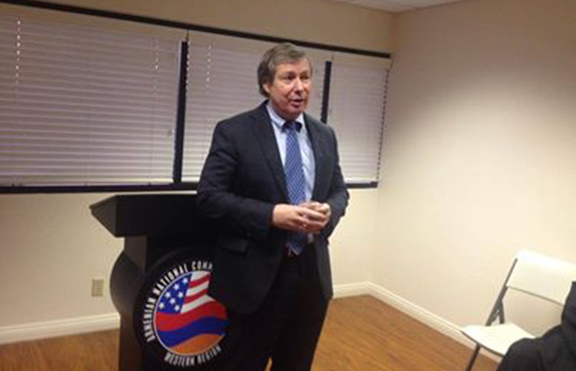
Ambassador James Warlick addresses a gathering of Armenian community leaders in 2014 in Glendale, organized by the ANCA-WR
BY ARA KHACHATOURIAN
After three years on the job as the United States’ top negotiator on the Nagoro-Karabakh peace talks, Ambassador James Warlick announced Monday that he will leave his post to take a job with a Russian law firm.
He made the announcement on Twitter, a social media tool he has used—excessively—throughout his tenure at the US Co-chair of the OSCE Minsk Group, often expressing views that angered the sides to the conflict, but mainly Armenia and Artsakh.
The most surprising aspect of Warlick’s announcement was that he is leaving his post to take on a job at the Russian law firm of Egorov Puginsky Afanasiev & Partners which has offices in Russia, Ukraine, Belarus, the UK and the US, positions him to advocate Russian interests in the US and creating a murky reality given his decades of service in the State Department. In announcing his appointment, the law firm highlighted Warlick’s service in the State Department, saying that “he brings unique policy expertise and hands on knowledge to clients who seek strategic advice and vision.”
From the onset, his views on the Artsakh issue were more in line with the Azerbaijani standpoint and he did not hesitate to firmly articulate them both in public statements and private meetings.
His outreach to Diaspora organizations was not intended to engage them in the process by listening to their perspectives, but rather a means to impose his positions and that of the United States’ on the Diasporan stakeholders and community. One such meeting in 2014 was followed by a presentation he made at the Carnegie Endowment, in which he urged the immediate return of what he called the “occupied territories,” a term consistent with the Azerbaijani vernacular when addressing the Karabakh conflict. Among other elements, he outlined a plan that places Armenia’s interests on the back burner with clear advantages for Azerbaijan.
What has been Warlick’s most egregious approach to the peace process has been the false parity articulated during heightened attacks by Azerbaijan like the four-day war in April. This approach continuously bolstered Baku to increase its military rhetoric and to also act on those words, since there would be no consequence from the international community.
His constant tweets and public statements, which far surpassed those of his French and Russian co-chairmen, was nothing short of bullying by an individual who is tasked with objectively mediating a conflict.
The uncertainty created by President-Elect Donald Trump’s transition process and who will lead the State Department already are raising questions about the US position on the Artsakh conflict. This, coupled with the appointment of Lieutenant General Michael Flynn, who is a paid lobbyist for Turkey as national security adviser heightens the challenges inherent in the position vis-à-vis Armenia and Armenian issues.
While Warlick’s brand of mediation will not be missed, his new position with a Russian law firm should sound alarms for the Artsakh conflict resolution, since he can use some of his prejudices to counsel governments and others to follow his path, which is in line with advancing Baku’s interests.
Source: Asbarez
Link: Warlick’s Brand of Mediation Will Not be Missed
